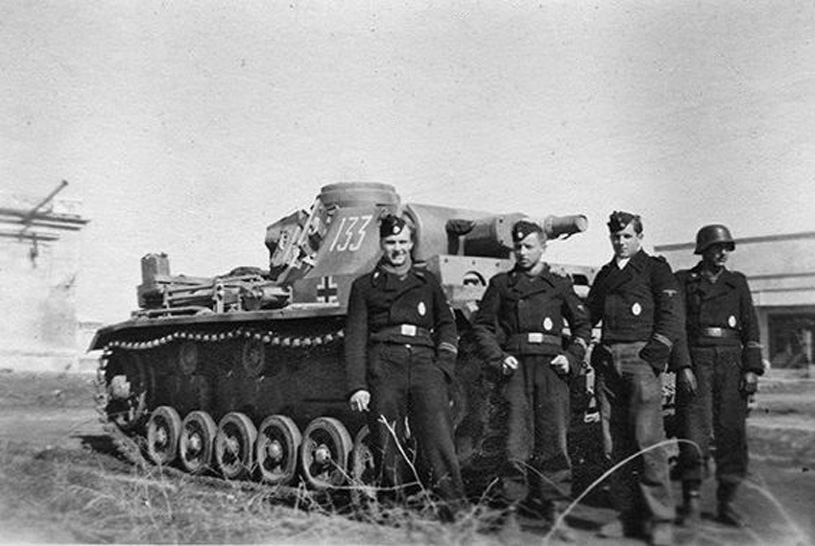Interview with Wolfgang Barth, member of the 3rd Waffen-SS Panzer Division "Totenkopf" and veteran of the Battle of Kursk, Veterans' Reunion, 1990.
[Above: A young Wolfgang Barth, July 1942.]

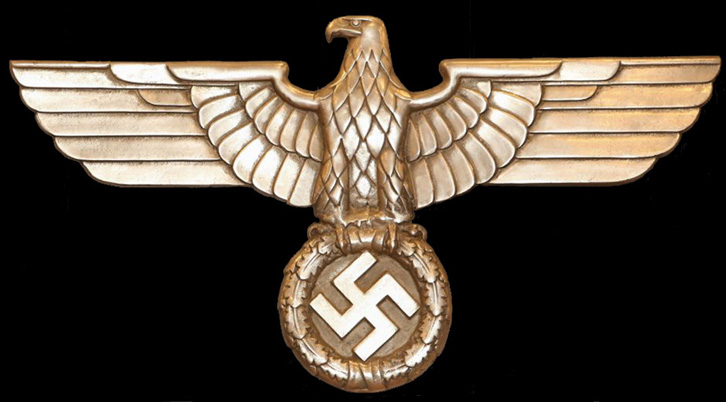
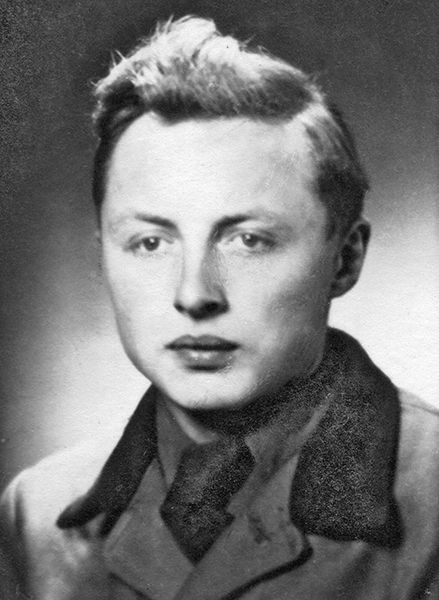
Interview with Wolfgang Barth, member of the 3rd Waffen-SS Panzer Division "Totenkopf" and veteran of the Battle of Kursk, Veterans' Reunion, 1990.
[Above: A young Wolfgang Barth, July 1942.]



Wolfgang: I would say my path started in the Church, in my confirmation classes it was always reinforced that the Bolsheviks wanted to destroy the Church and our faith. I knew a great danger laid in the east, and it tried to raise its head in Germany before the Führer stood up and destroyed it here. I was also in the Young People [The 'Deutsches Jungvolk in der Hitlerjugend' (German Young People in the Hitler Youth) was a separate group for boys aged 10 to 13] where we learned about German history, comradeship, and other things young boys do. In the Hitler Youth we started to learn about politics, the outdoors, and special trades if we wanted. I chose to learn about motors, and a reserve SS man helped teach the group. He would always say the SS was the Party's army, to help the Wehrmacht if we went to war. He wore his black uniform one day and we all were awed by his look. The SS for me was a very elite group of men and it provided many a path to better careers when their time was up.
When war broke out the SS was mobilized into combat units and sent to the front where they fought very well, they were seen as the Führer's own special army. Most newspapers wrote glowing accounts of their prowess on the battlefield. I followed the Waffen-SS in the papers to see their exploits being written about. I would buy 'Das Schwarze Korps' (The Black Corps) every so often to read up on issues. I knew I was going to be called up by 1942, so I decided I would volunteer first, as I would have my choice of where I wanted to go. I saw a Panzer unit go through our town and was very impressed at these machines. I was very mechanical and wanted to go to the Panzers, they fascinated me and they represented a new form of knights. When I applied I made it clear I wanted the Panzers and would not take any other position. It worked as I ended up in the Totenkopf Division, in the Panzer arm.
[Below: Das Schwarze Korps was the official newspaper of the SS. It was published every Wednesday, beginning on March 6, 1935 until March 29, 1945. Although many millions were distributed it is fairly rare today.]
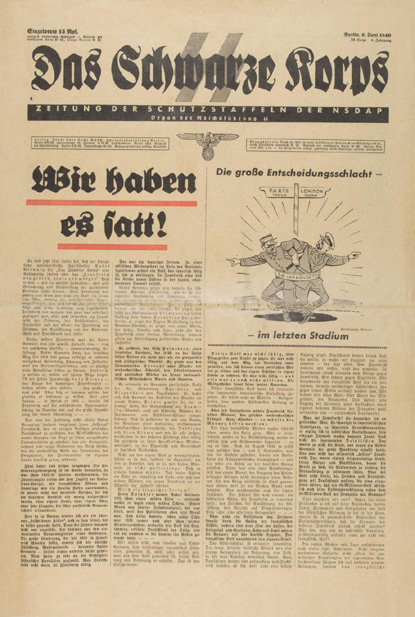
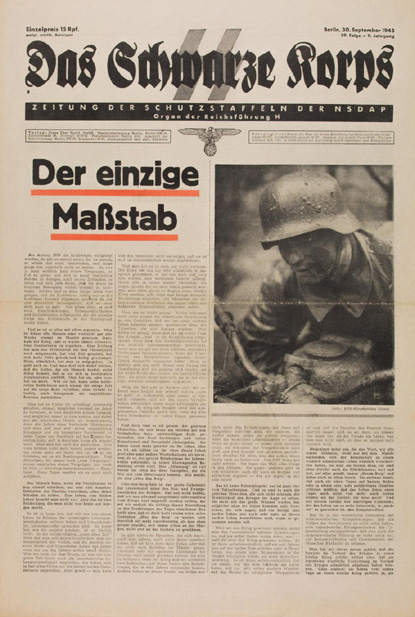
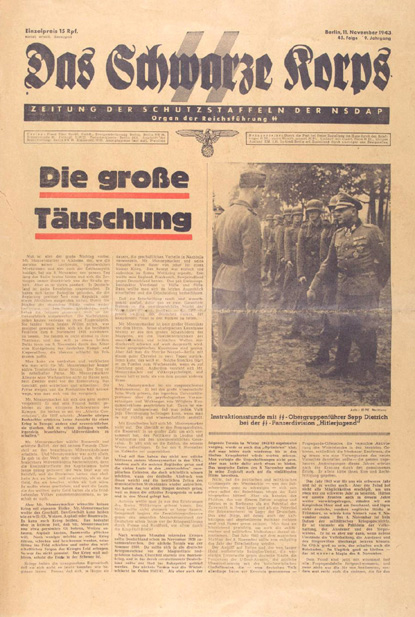
Wolfgang: In the very beginning I had to go through basic training which was more just learning military rules and life, we marched often and learned to handle weapons. Once I was accepted into the Panzer arm, we trained on the very basic of versions, the mkI and II which were largely pulled out of frontline service by 1942, sometimes we had use of the III. My class was trained by veterans of the wars in Poland and France; one instructor transferred from the Afrika Korps and had knocked out several British tanks. He showed us photos of them which gave us courage we could take on anything. After this long training time I was assigned to the 3rd Panzer Regiment of the 3rd SS Division Totenkopf. I brought photos of this to show.
We had the Panzer III in a few versions, the newest was the long barrel, and it was for frontline service. We met many veterans of the fighting and listened intently on what they said about the enemy. It was in a way funny you know, I became one of these types later in the war, angry at the young ones who seemed uninterested in surviving. By 1943 I had earned the Panzer Badge and was considered to be a proficient Panzer man now. I was selected to join the new Tiger company of the 3rd. This was a big moment for me. These Panzers were part of the cat family that made us very dangerous to the enemy.
We were sent for further training on these monsters and we were expected to know each other's jobs. We trained on learning repair and maintenance so we could keep it in the fight when things went wrong. I really liked the Tiger; it was roomier than the III or IV. The Tiger was my favorite out of all German Panzers.
It was certainly loud, hot, and bumpy to ride in, but it was home and offered good protection. Tiger crews felt very safe and knew this machine could take a lot of abuse. We could knock out any enemy, often from very long range without them even seeing us.
You fought on the east front, what do you remember the most?
Wolfgang: I remember how open Russia was, it was vast rolling fields, and sometimes to the north there were lakes and forests. You could go for many hours without seeing anyone. Now in the winter it was very cold and snowy, this stopped the drive on Moscow. Something I will tell you that is hidden today is how friendly the people were. It simply is not true they feared Germans.
I saw how they would offer food and shelter to us, and would come to seek aid if they needed to. In the bigger cities they set up shops and outdoor fairs to sell us things. If you listen to what is told today you would think we ravaged the nation and killed all the people.
This is not true and a vile lie the Soviets put out to hide the deaths they are responsible for. They killed many of their own after the war for helping us. This is common knowledge by those of us who were there, but no one believes us. The historians have been misled and believe what the former enemies tell them to believe.
I remember Russia as a huge, beautiful land with very friendly people who had been enslaved by Bolshevism and were happy to be free. In our free time we would go out to relax if it was safe. We would run into civilians fishing or wanting to just get away. There were never any problems.
The Russians were happy we brought western technology with us to help them, for the first time they could get x-rays and advanced treatment. Our medical unit treated many who sought help, which goes against what is said today. I have seen photos of Black Sea beaches full of people having a good time like there was no war. They tasted freedom for a few short years under our supposed evil occupation.
Can I ask you about the war crimes the SS and specifically Totenkopf are accused of; did you see any evidence of this?
Wolfgang: Yes, I was told you might ask about this. We must be careful with what we say, but I have to tell you I do not believe what is said today. War is not pleasant; it is quite cruel and unforgiving.
While I am not defending those who were bad men, and we did have them, most all SS men fought with honor and charity. I can give you a personal example: during Kursk, we were advancing and then had to stop. While scanning the field, we saw a white flag sticking up out of a trench.
I was ordered to go see what it was, I was very nervous as the Russians used tricks on us. I peered over the trench to see a group of soldiers led by a commissar. One was hit by a machine gun burst in his middle area, and was in bad shape. We learned to separate the commissars from the men, as they often incited them to tricks, so we took him back to be removed for interrogation. I went back and gave the wounded soldier some drink; I think I only had some alcohol left, but we found him water.
Our medical team came to get him and the other wounded, taking them back to receive care. That is the Waffen-SS I was a part of, we took prisoners, aided the wounded, and showed mercy to the vanquished. These claims of shooting civilians, prisoners of war, and looting are simply not true in my book.
I would agree that we did have a few who may not have followed the rules, I know some SS men were executed by SS firing squads for illegal killings and looting from civilians, but this was such a small percent that it would not be sane to judge us due to the actions of a tiny minority.
I also believe that many of the testimonies given after the war are politically motivated and not true. Many communists came out of hiding and told story after story of seeing people shot, the areas they were in were peaceful so it makes no sense.
[Below: A Waffen-SS knight helps a fallen Soviet soldier.]
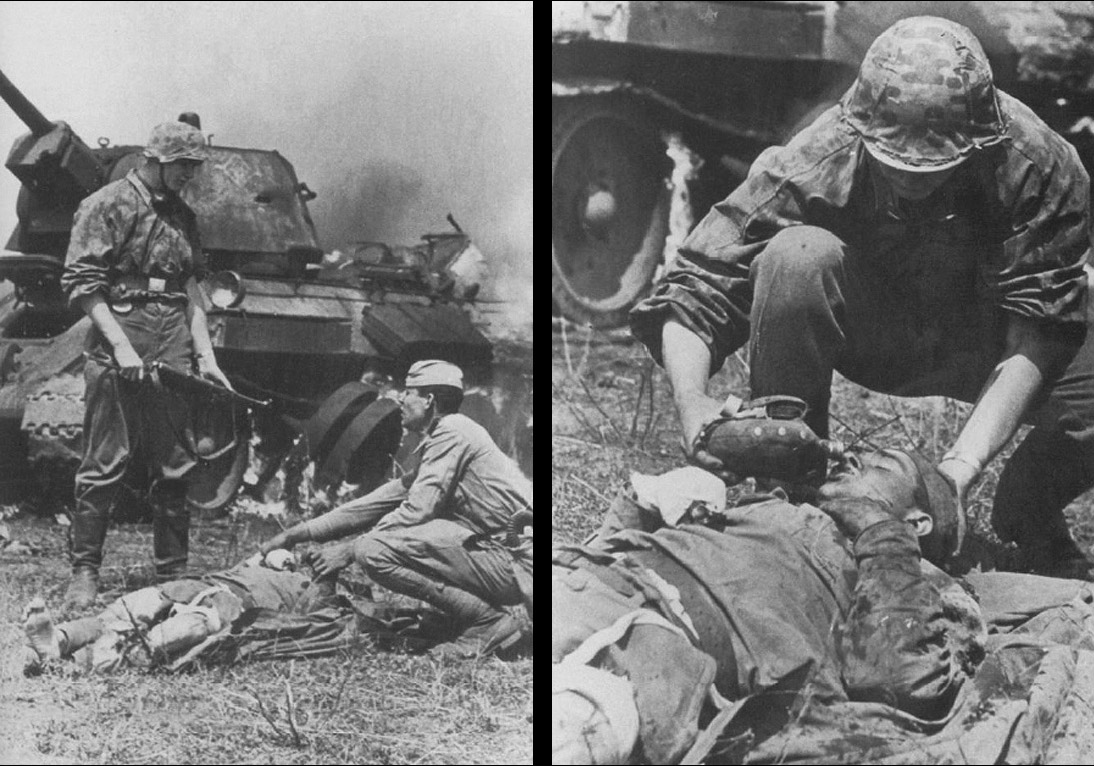
Wolfgang: No, I had never heard of this until the newspapers told of trials. This comes from the British so I am not sure I would believe them. I served well after the war in France, and there were not many who were in the Panzer regiment during that time. I did hear of some executions in France of war criminals that had killed wounded German soldiers or even French civilians. A man who was in the supply unit said he saw Negro soldiers being beaten by French civilians because they did something in a town they occupied.
The rumor was [Theodor] Eicke had them shot for rape and murder, but that was just a rumor. I was a soldier and did not concern myself with rumors or gossip. I personally saw nothing that would make me think our division had done anything wrong. I was in France during training and rebuilding, and the people got along well with us, even though we were in their country uninvited. Many of our men tried hard to have a French girlfriend to take their minds off the war.
You fought at Kursk, what was the battle like for you?
Wolfgang: I remember it was very hot that summer, we were moved into the area and had the Tiger, we knew the enemy was prepared for us as photos showed vast defensive fronts. We were determined to smash them, and rumor was that Stalin was on his last leg.
The morning of the battle I remember all the artillery fire and Stukas, they plastered the enemy lines. As soon as we advanced Soviet soldiers came out of nowhere and started giving up. The bombardments were so severe that they broke the first line open, and our troops surged in.
It was only after we hit the second and third rings that it got harder, and the T34 joined in. I still hear the rounds bouncing off our Tiger. We knocked out several anti-tank guns, T34s and flame boxes. The enemy was very clever in how they hid their guns, we had to be very vigilant, yet keep moving forward at all costs.
It seemed like we were beating every counterattack they could launch at us, even though the attack was slow, we were advancing. I saw many prisoners being moved to the rear. The Luftwaffe had control and was pummeling the enemy; we saw the work of Stukas often.
They say this was the largest tank battle and I would believe it, everywhere you looked there was burnt-out enemy tanks. Our regiment had rolling tallies and contests on the amount we could knock out. This was a large area but with hardly any places of respite. We both were throwing everything into this battle.
The weather was hot and we were miserable, often fighting in our underwear, drenched in sweat. The Russians outnumbered us by quite a large gap, and they did cause us losses, a comrade died right in front of me from artillery fire.
Do you believe Germany could have been victorious at Kursk?
Wolfgang: Dear boy, we were victorious, we punched through all rings, were encircling the enemy, and forced him to commit his reserves. We still had our reserves and lots of fight left. Our problem was we had very inept and bad leaders.
They betrayed Germany and caused the deaths of thousands of German soldiers. All of them were bad, after the war they got to work with the Allies, and write memoirs where they blame the Führer for their failures. They will someday go down as a stain on Germany's honor and their mistakes will be shown.
I have been told the Führer did not want to even attack at Kursk, but they told him false numbers, much like in the beginning of Barbarossa, and hindered supplies. Just when we were at the critical moment when victory would be ours, they convinced him it was lost and we had to stop the attack.
We had bled Russia white and they were ready to sue for peace, the war would have been won in the east and then we could have dealt with the Allies to work out peace. These traitors lied to him, and hid things from him that cost us the war. I was there, I saw how we had inflicted such huge losses on them, and the prisoners we took told of them being used up and done.
The war was lost for Russia in July of 1943, only our high command saved them. I have heard also the Allies begged Stalin to stay in and promised him all sorts of supplies if he did. We cut off lots of their oil, took most of their fertile farmland, and most major cities. Russia was not able to launch any sizable offensives for a whole year. We beat them that badly.
Kursk is the greatest blunder in all of history, based on what could have been but due to the ineptitude of the army staff. We lost many comrades who died in vain so these morons could try to show they knew more than the Führer. I was happy when they were exposed on July 20th [1944].
Did you feel like there was animosity or jealously between the SS and the army?
Wolfgang: No, in fact the army may have been jealous they were not part of the
Waffen-SS. We were all the same comrades in the fight together. Many times they were glad to have us anchored on the flanks. They knew we were very tough and would not run away.
We saved many army units from being overrun and destroyed.
At the same time we did not look down on the army, they were our comrades and deserved respect for the job they did. After the war some have told of the animosity between us, but I think this is more to play into the Allies' forgiveness.
After the war everyone was quick to distance themselves from the NSDAP and SS, they did not want to go to prison. They would tell of all sorts of tales about fear, abuse, or threats thinking this would cast them as the victim and save them.
Some have even told horrid tales of atrocities which I do not believe, but they get fawned over by the controlled press. It has only become a recent development where the army has distanced itself from the Waffen-SS, even though both fought for the common good.
Would you say you are proud to be a former member of the Waffen-SS?
Wolfgang: Yes I am and I have never been afraid to say it. Even when the Allies captured me in Linz I made it clear I was an officer of the Waffen-SS. We have nothing to be ashamed of and fought our enemies well. We fought with honor, courage, and faith and most of us who survived call each other comrade still.
Even with the Allied internment camps, abuse, forced humiliation, and shame we stand blameless and loyal. These reunions are what we have left to remember our time together and make new friends. In spite of the current hostility and smears, a good crowd comes out to greet us and learn.
I am pleased you and Mark came to learn and see us, we are happy to speak openly with you. You have many friends in our group and they always feel relieved to speak to you the truth of how we lived and fought.
[Above: Wolfgang Barth (2nd from left) poses with the crew of Panzer 133, a short-barrelled 7.5cm L/24 Panzer III Ausf. N, southern France, November 1942.]
